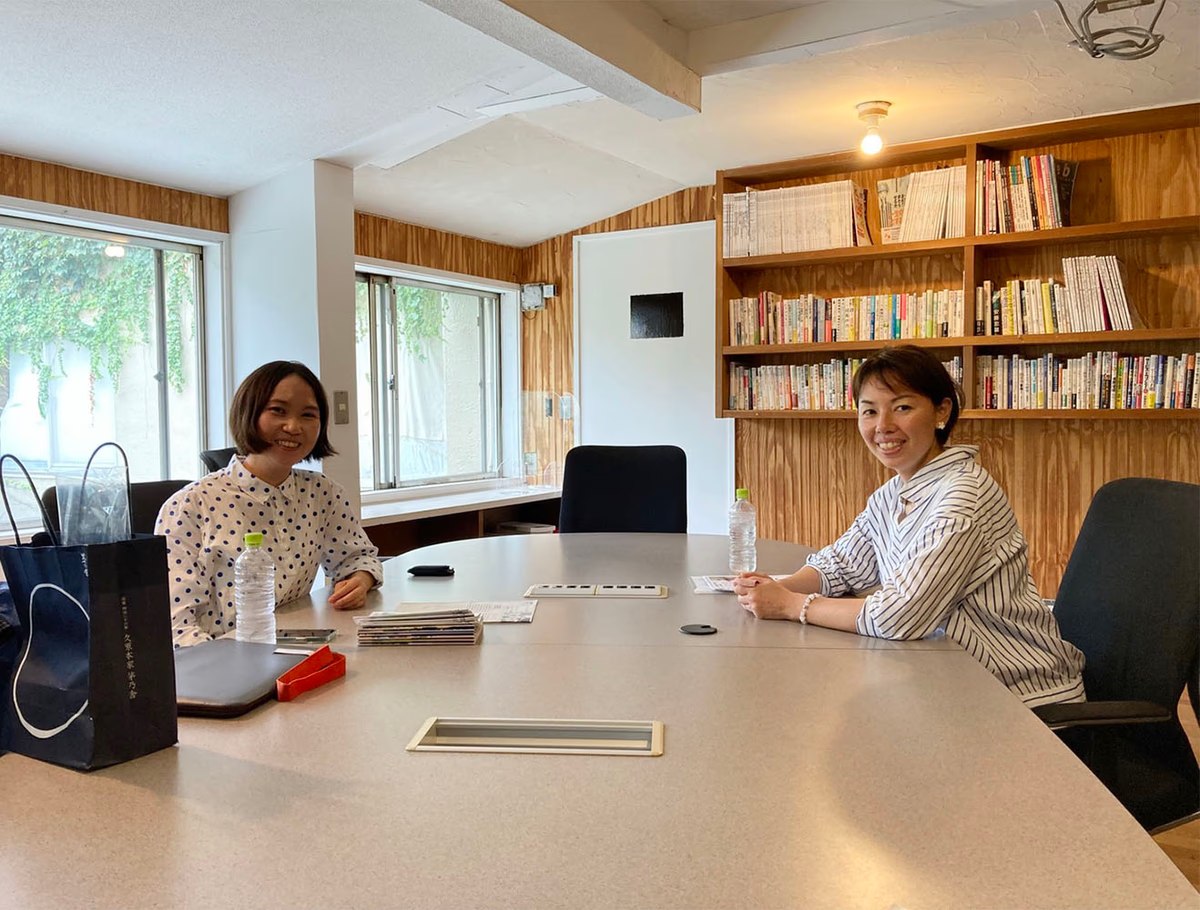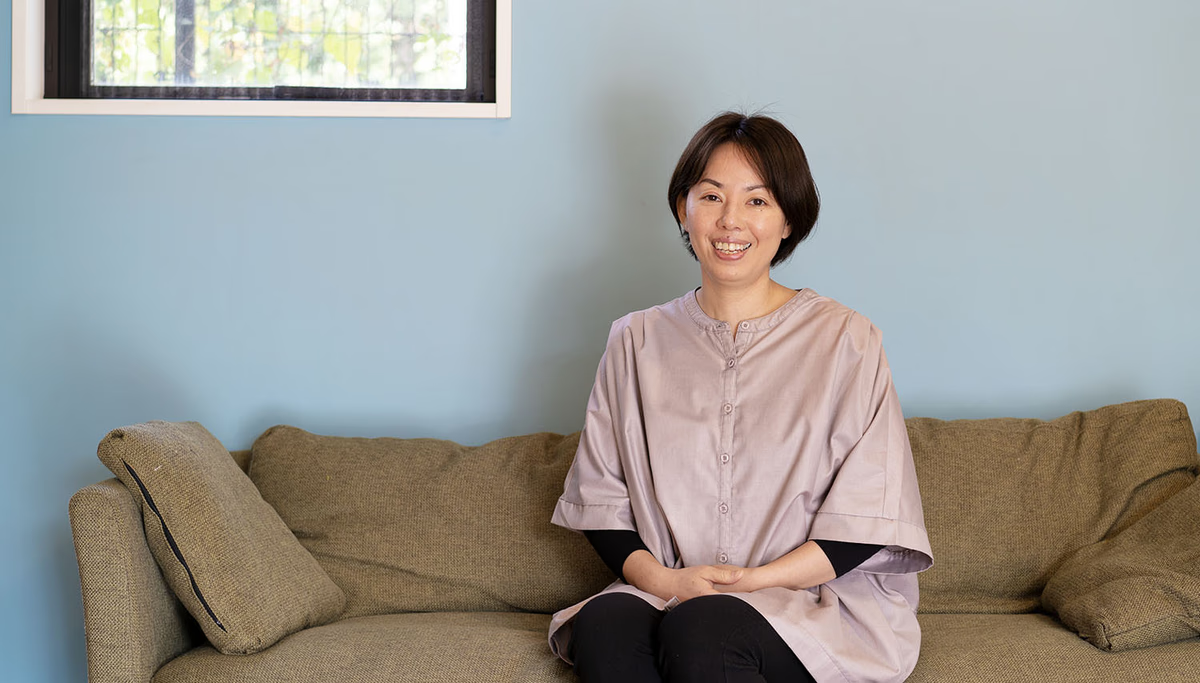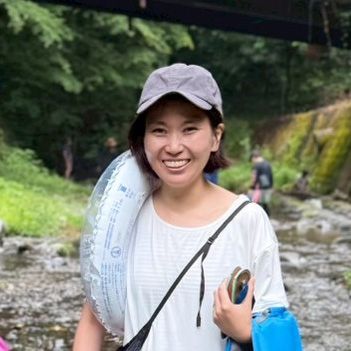In the first episode of "Care no Wa," I will share my interview with Yoshiko Tanaka, the midwife who delivered my first child in 2020.
What prompted me to start this column was my own experience of giving birth and raising a child. The first thing that surprised me about my first experience of raising a child was how much humans need someone's care after they are born. The soft, squishy body of a newborn baby is only able to survive after its guardians have worked so hard to look after it. It's amazing to think that everyone, whether it be my parents, grandparents, coworkers, or friends, has survived while receiving so much care from someone.
At the same time, I believe that in the future, people will continue to give and receive care for various reasons, such as old age, illness, unexpected accidents, disasters, etc. However, many aspects of caregiving cannot be seen unless you are actually involved, and it is often closed off within the context of individuals or families, with people thinking of it as "my responsibility" or "my family's responsibility."
I feel it is easier to live in a world of mutual support rather than a world where responsibility is the focus, so I wanted to delve deeper into the relationships between caring for and being cared for, and that is why I started this column.
In the first episode, we talk to midwife Tanaka-san. We asked her about the job of midwife, her community-based activities that started from her own experience raising children, and her thoughts on care.
(Interviewed September 4, 2021)
- "Emergency medicine is the right fit for me" - the story of how she became a midwife
- Maybe my children will teach me everything. Parenting starts with facing yourself.
- The steady struggle of a local midwife that began with the realization, "Raising a child is so hard!"
- Supporting children's development, sensory integration and outdoor play
- It's important to go with the flow, let go, and wait.
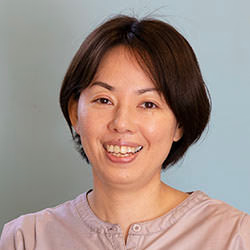
Profile of Yoshiko Tanaka Freelance midwife. 29 years of experience as a nurse-midwife. After working in the ICU and teaching nursing at a university hospital, she opened a care service in Chofu City. She established the Gegege Town Midwife Association and is the organizer of the Amanma care service for mothers and children. She inherited the midwife spirit and is involved in midwifery activities rooted in the community, working closely with women, children, and families. She is also expanding her activities for the future of children, such as baby chiropractic using craniosacral therapy, children's motor development, and sex education.
"Emergency medicine is the right fit for me."
My story of becoming a midwife
While working as a midwife , you also support child rearing and engage in community activities, so I have a lot to ask you. First, I would like to ask you about your work as a midwife.
It seems like there are a lot of people who don't even know that midwives exist, Tanaka-san .
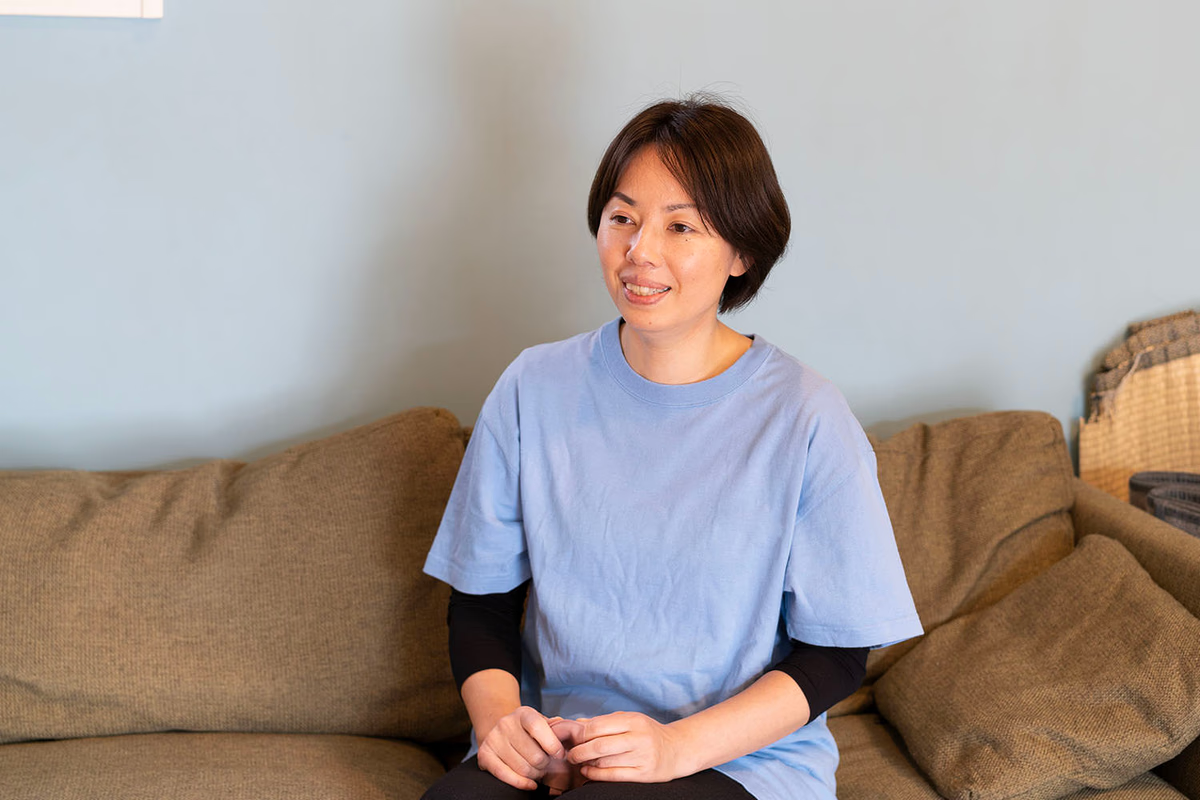
I didn't know anything about it until I gave birth, but it's amazing. I was surprised to see that there are people in this profession in the world. I think most of the midwives at the hospital where I was were young, but I relied on them.
Ms. Tanaka: Everyone who has given birth has said the same thing. Most people don't understand the existence of midwives until they give birth.
Childbirth is a critical situation, isn't it? It's really important to support and be there for the mother in that critical situation, and to feel that someone is there to support you. There's a kind of human contact, and it deepens the relationship of trust. In the case of natural childbirth, the ability of us midwives is to be there for the mother during the most difficult time, the "first stage of labor * ," to encourage her, and to support her so that she can give birth on her own.
*First stage of labor: Contractions begin every 10 minutes until the cervix is fully dilated.
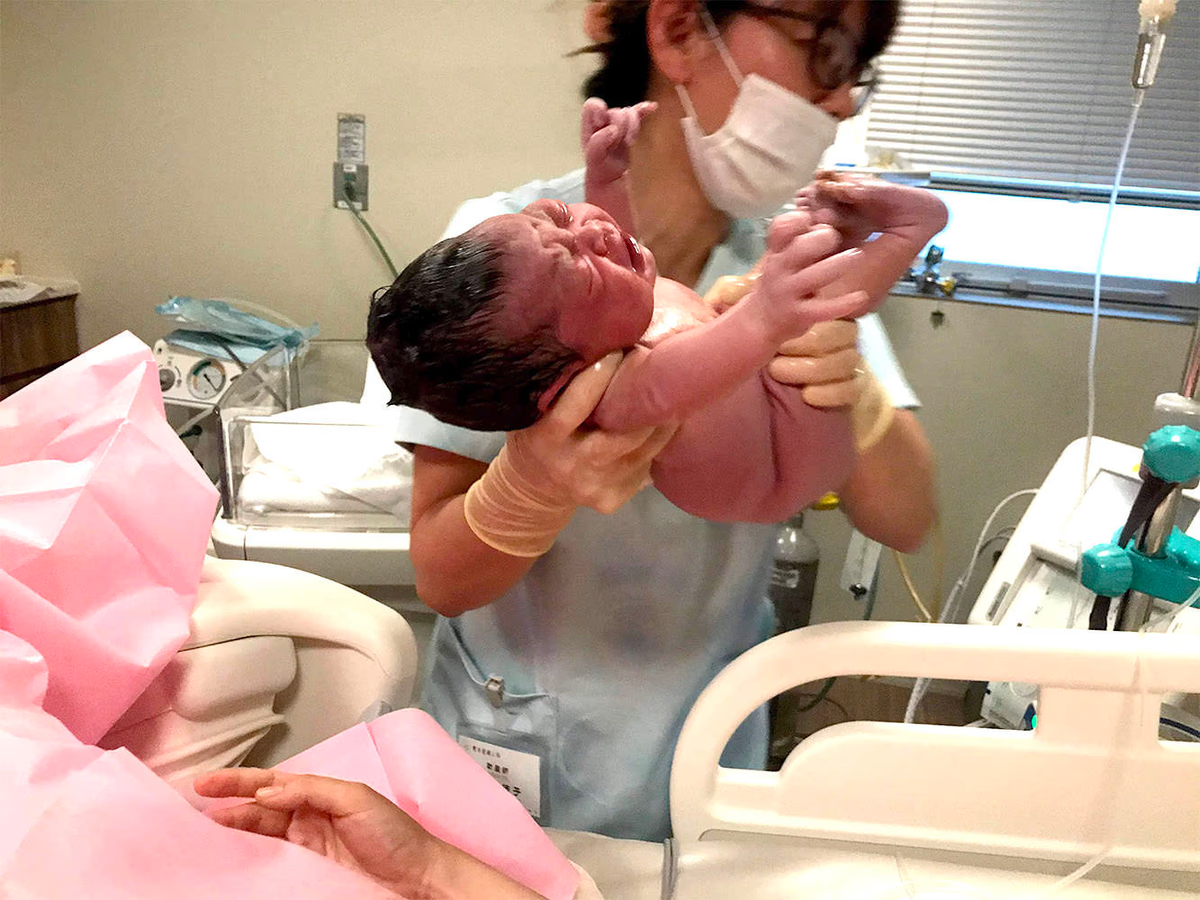 Mr. Tanaka, who gave birth to my child
Mr. Tanaka, who gave birth to my child
How did you become a courtyard midwife?
When Ms. Tanaka was in high school, she happened to see a documentary about midwifery in Africa and thought, "Wow, there's work like this overseas!" That's what got her started. She wanted to become a midwife and go to developing countries or join the Japan Overseas Cooperation Volunteers. Since a nursing license is required to become a midwife, she first went to nursing school for three years, but instead of becoming a midwife right away, she worked as a nurse in brain surgery and the ICU (intensive care unit) for about five years.
ICU was rewarding, but many patients died despite my best efforts. I felt the limitations of life-saving medical care and suffered from burnout, so I thought about leaving the nursing field for a while. However, I couldn't give up on my dream of becoming a midwife, so I moved to obstetrics and gynecology.
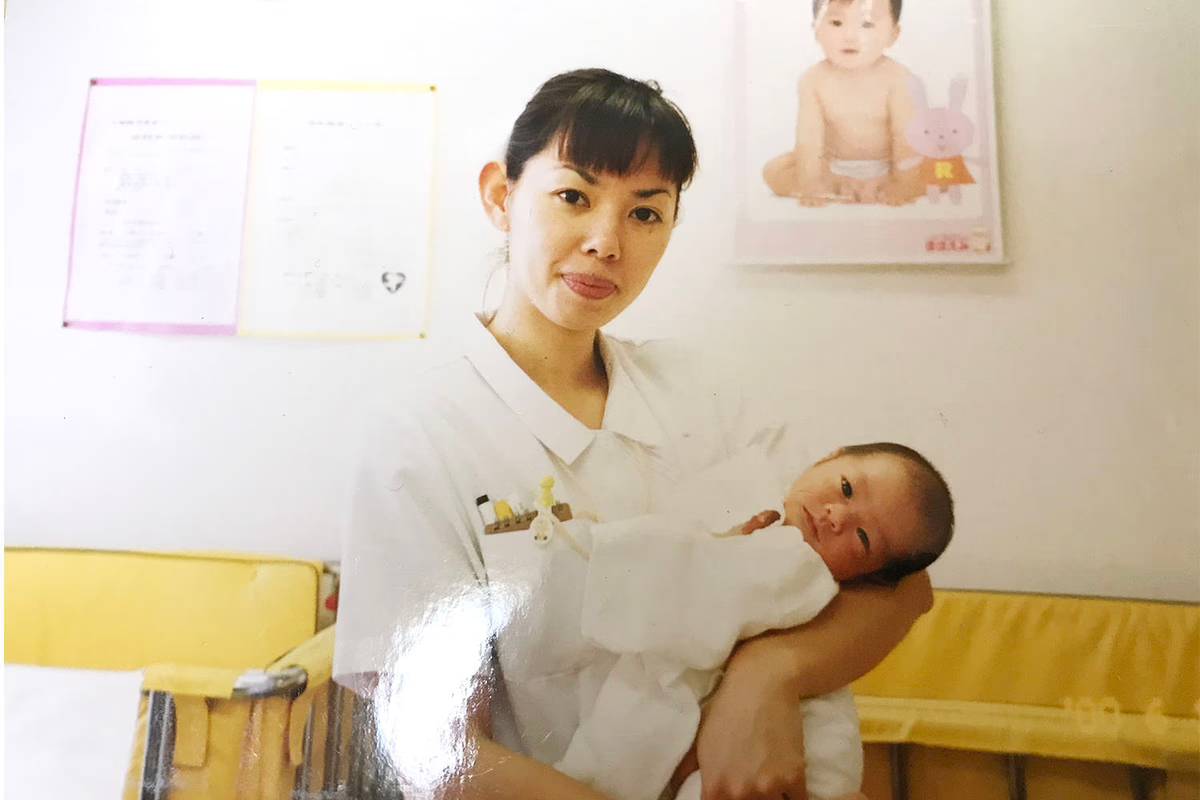 Tanaka-san when she first became a midwife
Tanaka-san when she first became a midwife
So you didn't become a midwife right away ?
Tanaka: I decided to enter obstetrics and gynecology while still a nurse to see if I really wanted to become a midwife. I decided it was the right choice, so I got my midwife qualification. After that, I returned to the university hospital and worked in childbirth again. Emergency medical care, like what I did in the ICU, suited me, but obstetrics also has an emergency aspect.
When I think back to the circumstances of my birth, I get the impression that the more you push yourself, the more energy you get, so I agree with what you just said (laughs). Could you tell me a bit more about why emergency medicine is right for you?
Tanaka-san has never had any experience of being injured himself, but he used to read books like emergency manuals from a young age. I don't know when it happened, but I'm the type of person who is always thinking about what to do in a crisis situation, for example, when an earthquake occurs.
It was the same during the Great East Japan Earthquake, but even when I was in ICU, I felt that you never know what will happen tomorrow, or even in the next second. So I'm always thinking about how to enjoy life in the present and what I should do to survive.
Especially in the case of disasters, we need to help each other in the community when something happens. In Chofu City, where I live, I have served as the chairman of the local disaster prevention committee for two years, and I also serve as a disaster prevention committee member for the Tokyo Midwives Association. I believe that in order to protect children, we need to do our best in the community. I also hold disaster prevention classes for families with children every year, and promote disaster prevention training and preparation.
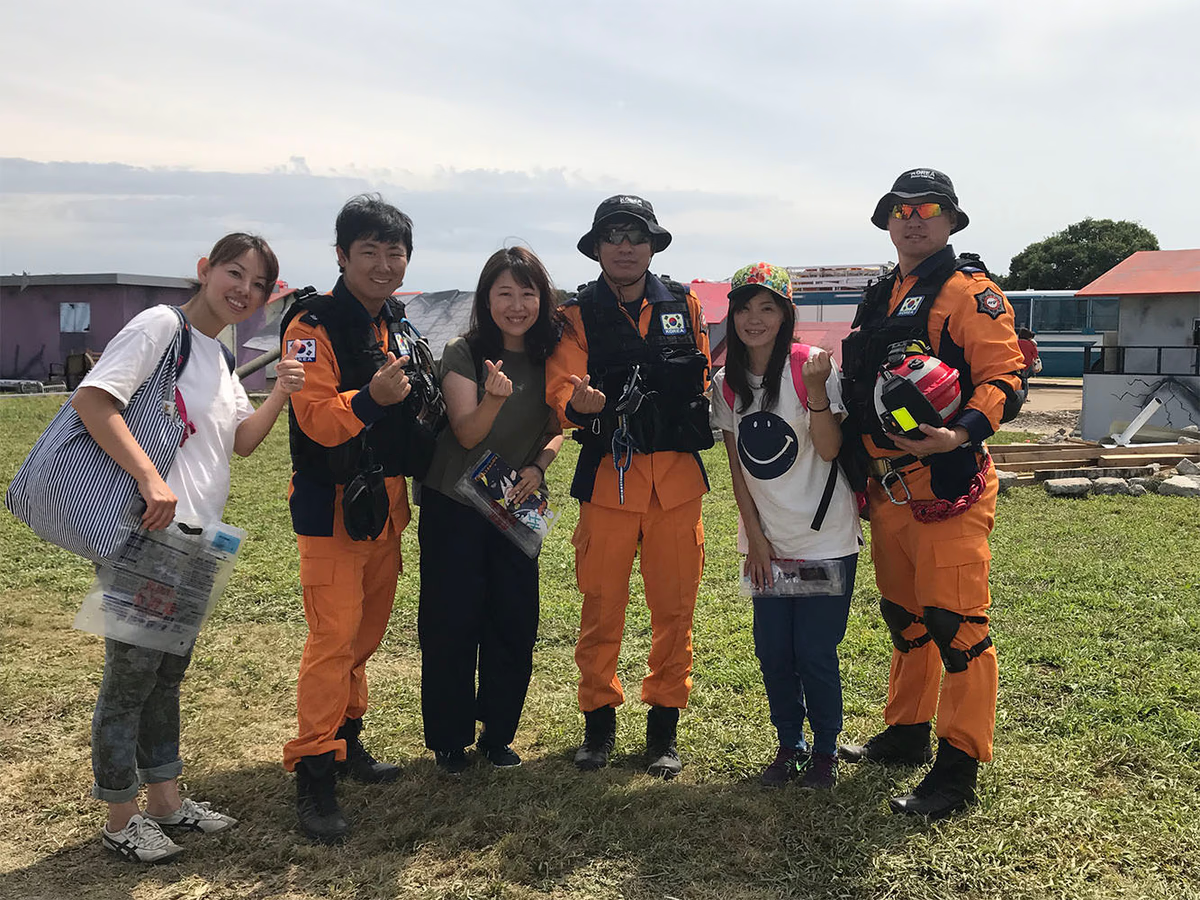 With Korean rescue teams at the 2017 Chofu City District Council (Disaster Prevention).
With Korean rescue teams at the 2017 Chofu City District Council (Disaster Prevention).
Maybe my children will teach me everything. Parenting starts with facing yourself.
Has your job as a midwife in the courtyard continued smoothly?
Tanaka
I became a midwife at the age of 29, got married at 30, and had a child at 32. Until then, I had been working full-time at a university hospital, but raising a child was difficult. I could no longer work full-time at the university hospital.
Is that what the courtyard was like?
Tanaka: I'm a midwife and had some knowledge, but child-rearing was a completely unknown world to me. It was okay with my first child, but after I had my second child, who was two years apart, it was so difficult that I suffered from child-rearing neurosis and postpartum depression.
Up until then, I thought that if I worked hard, I could achieve results, and I thought I could do the same with raising children. My husband also had night shifts, so I was raising my children alone, as we would call it today.
I had always worked outside, but now I was stuck at home raising my child, and I was feeling conflicted. I thought, "Maybe I'm not cut out to raise a child?" and, "I'm a midwife and I'm thinking things like that..." I thought being a midwife meant I had to do it properly.
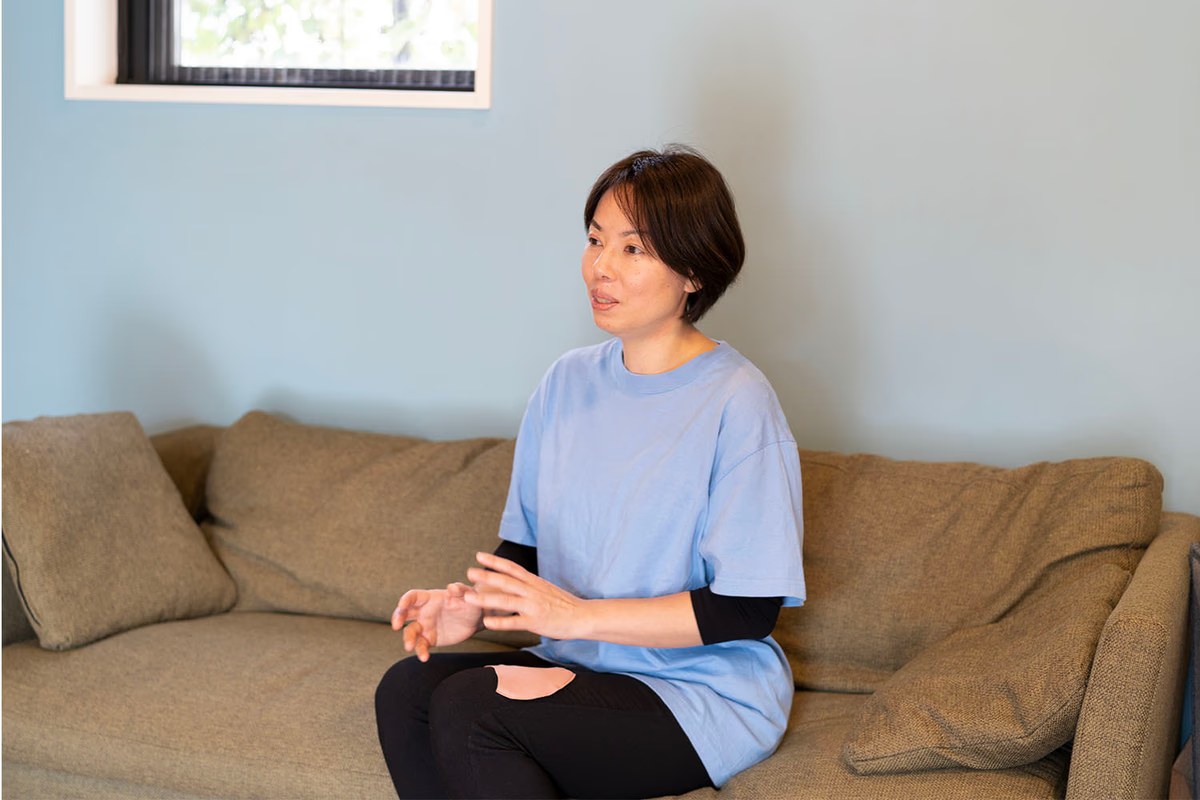
Tanaka
When my second child was born, my older son reverted to babyhood and my younger daughter cried a lot at night. My daughter's night crying continued until she entered elementary school. When I was breastfeeding, I thought she was crying because she wanted to be breastfed, and I thought it was normal, but it was still bad even after I stopped breastfeeding, and even after she entered nursery school.
It wasn't just normal night crying, but more like writhing around. It was so bad that I thought she had night terrors. If I tried to soothe her, she would get worse, so I just had to leave her alone. After that, when my daughter was able to talk, I asked her about it, and it seemed like she was stressed at the nursery school and had had scary dreams. She was a sensitive child. At the time, I didn't know the reason, so I tried various things and thought it was impossible.
The courtyard is impossible...
Tanaka: I can't even raise my daughter. I feel like abandoning my child. I told my husband, "I can't do it anymore, so you raise it." (laughs) I just couldn't face it. But I guess you can't run away from raising a child.
My youngest child is sometimes cute, but sometimes I don't feel that she is cute. When I thought about it, I realized that I was jealous of my daughter when she innocently depended on my husband, "Daddy."
My parents divorced when I was about four years old. So I didn't have a father figure close to me. I was raised by a single parent, and although I saw my father, I wasn't in a situation where I could depend on him that much.
It was a strange feeling. I thought to myself, "I couldn't have done this." I had always dreamed of having a family, and I got married and started a family, but I had never experienced the ideal family I had in mind. I was missing the idea of having a father and a mother and being spoiled.
My husband was raised in a happy family, so he is able to let his kids dote on him and play with them, and he is able to do so naturally. He is very good with children. I can't do that either. While my children were doting on their father and playing innocently, I felt like I was the only one who was out of the loop.
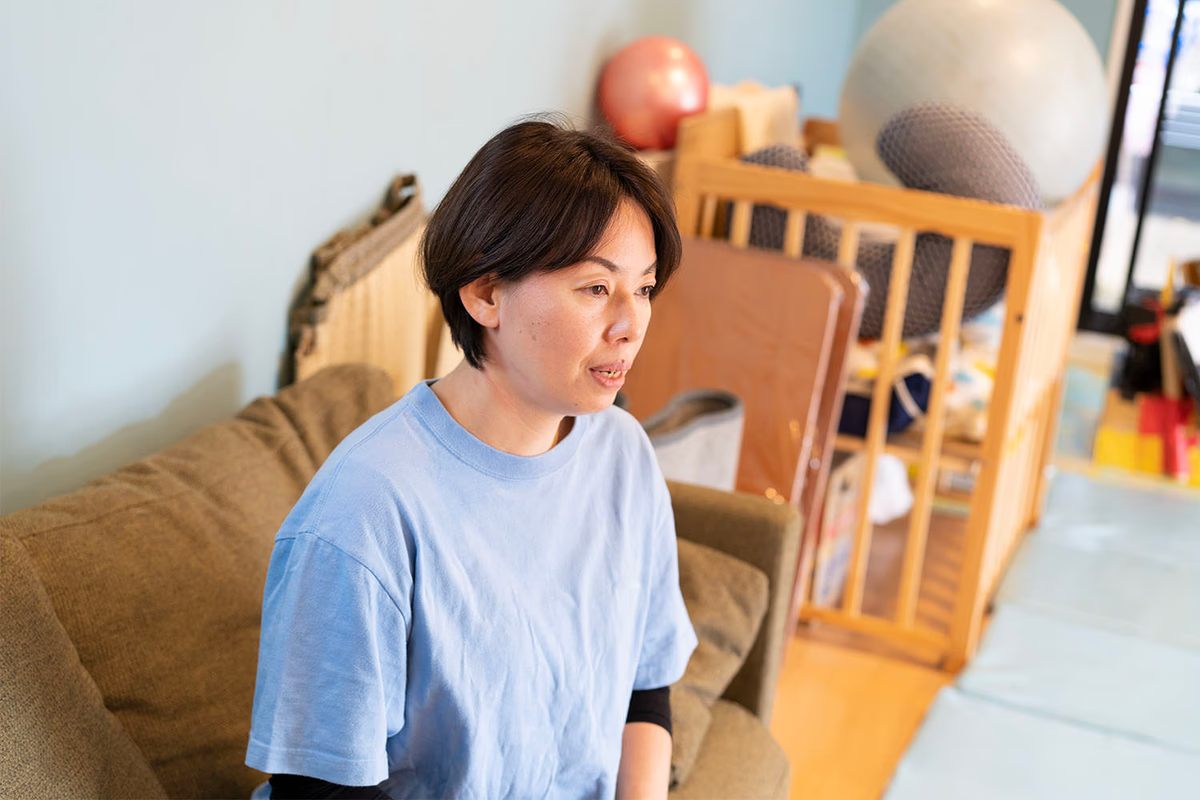
I knew I had to face my daughter, but when she was in the first grade of elementary school, she rejected me a lot. She would say things like, "Die, go away!" She wouldn't tell her dad, she would only lash out at me. Eventually, my daughter's hip joints stopped moving. She couldn't walk, so I took her to the chiropractor who taught me how to treat her.
The doctor looked at my daughter's inner self and mental health, and after examining her, he said, "This girl isn't telling her mother what she really thinks. Isn't that your own inner child?" That was the first time I heard the term "inner child." After some in-depth counseling, I realized that in my childhood, I blamed myself for my parents' divorce. So, rather than doing something about my daughter, I was told that I should first heal myself.
At first, I didn't get it, but when I imagined myself as a child and hugged myself saying "You're not at all bad, it's okay" and repeated that image before going to bed, tears naturally came out. I continued to just accept the hidden emotions. Eventually, my daughter stopped using abusive language. In the end, I had to face myself.
I think of raising children as "re-raising yourself". There are many people who find it difficult because their children make them see their past as they grow up. Children teach me that letting those feelings out makes raising children easier. I want to convey this to other mothers too. There are times when you feel like you can't love your child. It's not your fault, and those feelings are natural. I tell them that I've had those experiences too. But in the end, you have to realize it yourself. I think your child will tell you everything.
There is a lot of learning in the courtyard . It's like something is brought to light in raising children. As I watch my children grow, I feel like I'm tracing my own childhood, or growing up again. My daughter is 1 year and 3 months old, and I think there will be more things to face when she grows a little more.
Tanaka: I think there are people who find child-rearing easy. You say it's effortless, but I think there will be people like that at some point, and they'll have to face their children at some point. That could be when they reach adolescence.
I was able to face my daughter early on by getting her to reveal her deepest feelings, so now she's in the third year of junior high school, but she hasn't had a particularly bad rebellious phase. On the contrary, we've become good friends and she tells me everything. I think it's easier to face your child at an early age.
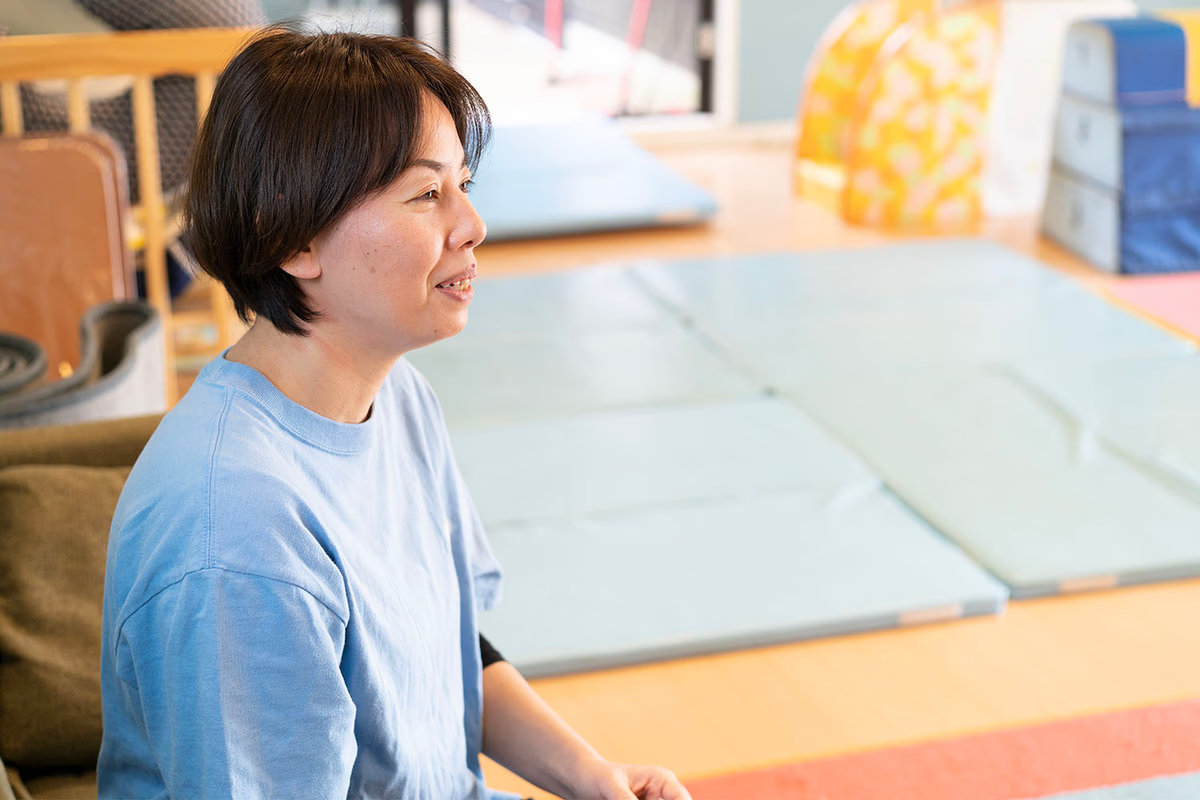
"Raising a child is so hard!"
It all started with,
The steady struggle of local midwives
NakaniI think that the typical image of a midwife is that they work from when a woman is pregnant until just after she gives birth. But Tanaka's work continues after that. She also provides childcare support in the community.
Tanaka-san started her community activities around 2011. It all started when she thought, "Raising children is so hard! If that's the case, I need to get involved over a longer period of time." First, she reached out to midwives in Chofu, where she lives, and started up the "GeGeGe Town Midwives Association."
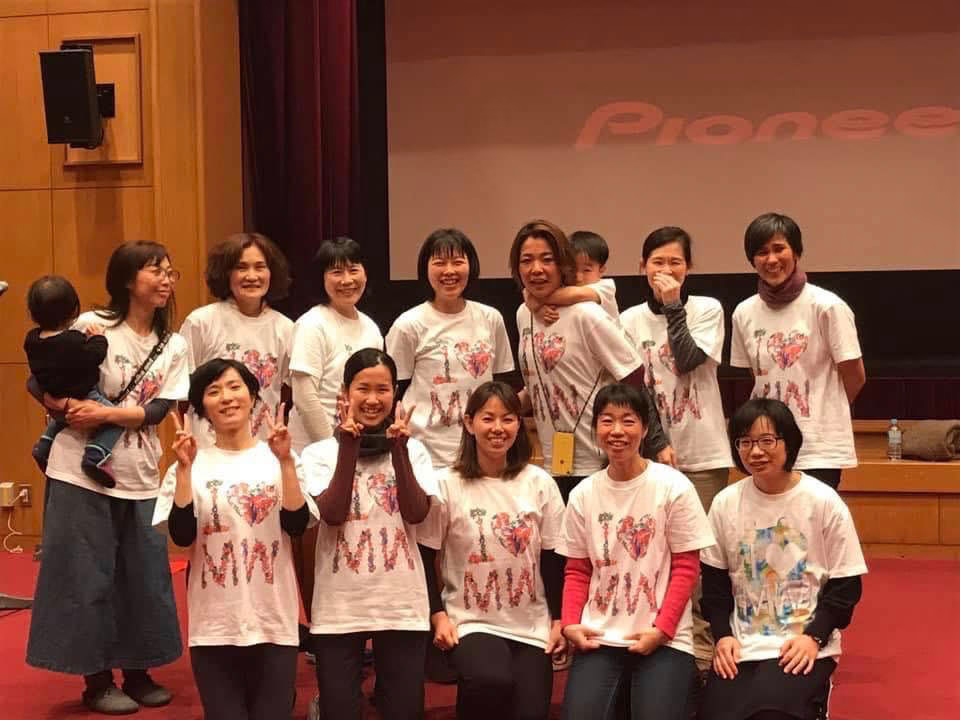 Members of the Gegege Town Midwife Association
Members of the Gegege Town Midwife Association
Tanaka: I think we have about 30 members now. Although we haven't been able to do activities recently due to the need to prevent infectious diseases, we have been steadily holding monthly classes for the past 10 years. The midwives are volunteers and work hard. The name "Midwives of Gegege Town" had an impact, and it is gradually becoming known throughout the country.
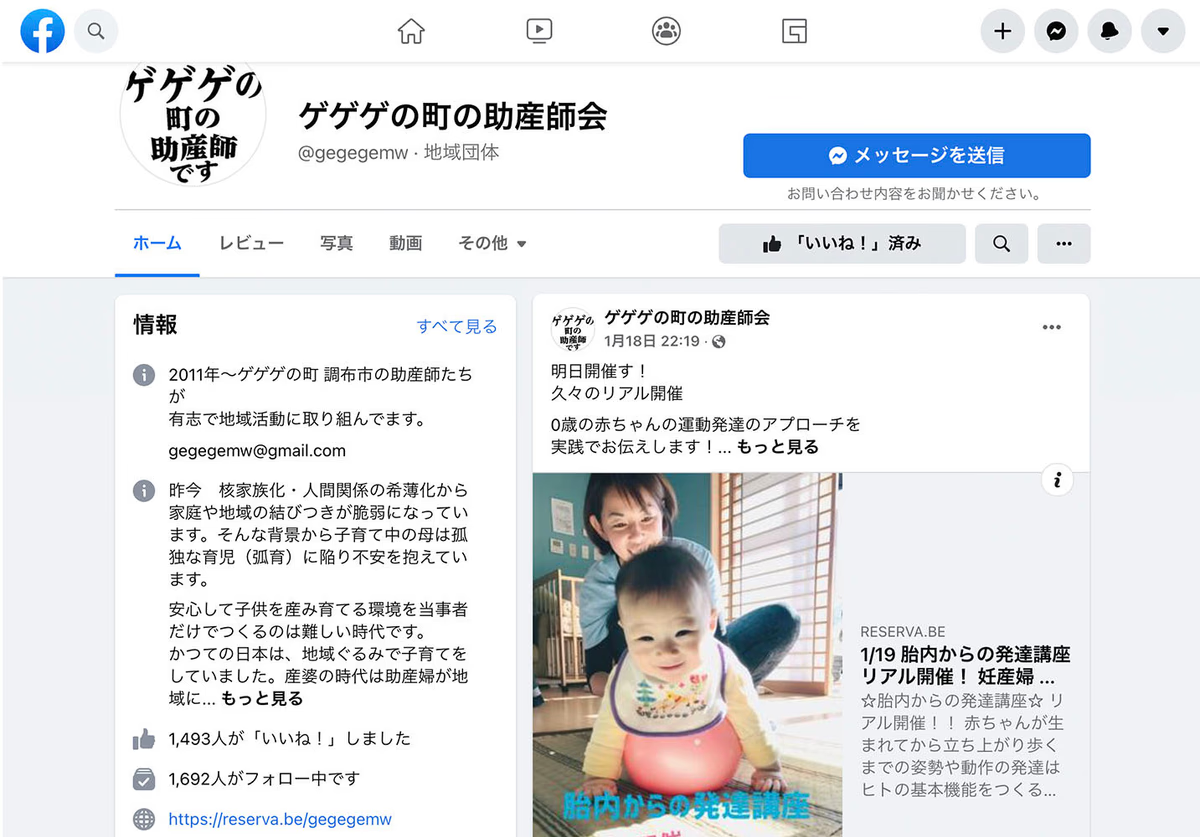 Gegege Town Midwives Association Facebook page . Announcements of lectures and consultations, activity reports, etc. are posted.
Gegege Town Midwives Association Facebook page . Announcements of lectures and consultations, activity reports, etc. are posted.
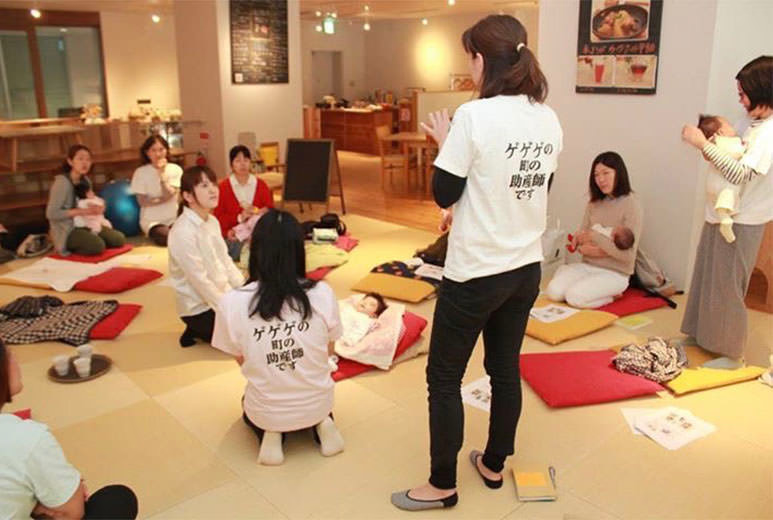 Regular classes are held at the Childrearing Cafe in Chofu City
Regular classes are held at the Childrearing Cafe in Chofu City
Tanaka also participated in "baby visits " as a community activity for about eight years.
*Baby visiting: A system in which public health nurses and midwives visit homes around one month after birth to check on the baby's health and how the parents are doing, in order to prevent child abuse and depression among parents.
Has courtyard baby visitation always been around?
Tanaka: It's a system that has been around for a long time. In some areas, it's the welfare officer or the public health nurse who visits, and there are cases where midwives don't go. But we think that the first visit to a newborn should be made by a midwife with knowledge and experience. The number of municipalities where midwives go is increasing.
I want the midwife to come to the courtyard . Speaking from my own experience, after my child was born, I had a lot of questions about child-rearing. In the past, there were people in the community who had experience raising children, and grandparents nearby, so there would have been people I could consult with, but nowadays it's easy to become isolated, and especially with COVID, all the child-rearing study sessions have been canceled, so I had no one to ask. So for me, the midwife is my only hope. I would catch the midwife who came to visit the baby and ask her all sorts of questions from a list of questions I prepared in advance. I would like the midwife to be my advisor for about a year after the baby is born.
Tanaka: The systems for this vary greatly from region to region. In some areas, you can visit your baby not once, but up to six times. Postpartum care subsidies also vary by municipality.
Communities can be very difficult. After the war, the GHQ enacted the "Health, Nursing and Medical Care Act," and public health nurses took over the role of "community health." Before that, however, there were midwives in the community who cared for the mothers, children, and families in the community.
That's why midwives go out to the community, it's an old-fashioned way of raising children. I want people of today to know about the era of midwives rooted in the community. I've been working to have midwives properly placed within the government, wondering if there's some way we can create a system where we can be close to people and take a supportive stance.
First, we approached the local government to have midwives stationed at children's centers, because children's centers are the easiest place for mothers to visit after giving birth.
Courtyard: That's right. I used to go there too.
Tanaka-san , the profession of midwifery itself was not well known. When asked, "What do midwives do besides childbirth?", she fought by appealing, "No, no, we have a role to play in supporting women throughout their lives." And now, finally, midwives can enter children's centers.
We started by asking them, "We will start as volunteers, so if it's actually OK, please create a system." Because the mothers have built a relationship of trust with the midwives, they feel at ease even when they meet the midwife for the first time. The response was so good that they started a business of "monthly midwife consultations," and now we are properly paid. It was the first time in the country that a midwife has been employed at a children's center.
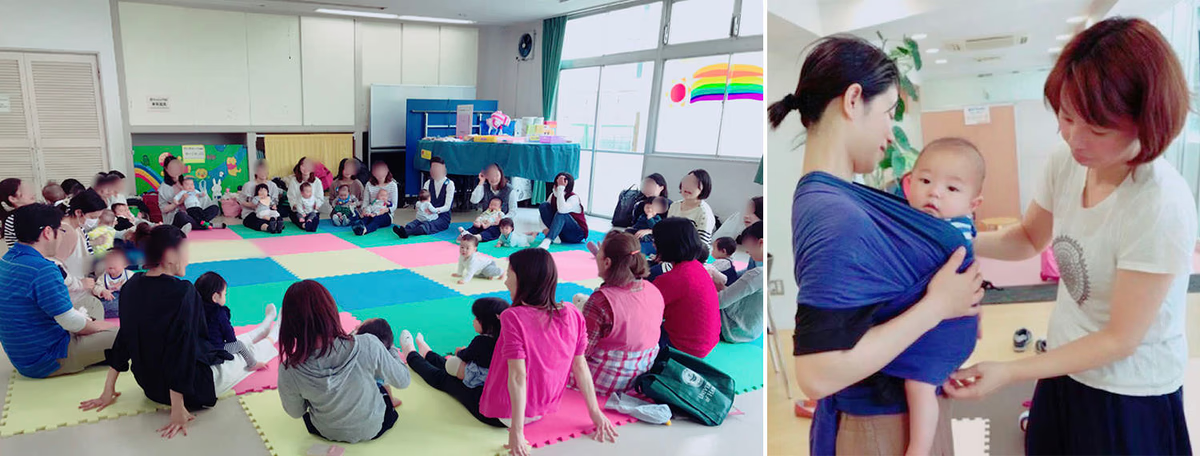 Child-rearing consultation session at a children's center
Child-rearing consultation session at a children's center
Ms. Tanaka: Over the past 10 years, we have been appealing to the public that there are midwives in the community, and we have been recognized by the government and local people. All midwives want to go out into the community, but it's difficult now. You can't work unless you're affiliated with a hospital. I have a traveling practice, but there are almost no midwife clinics that specialize in childbirth anymore.
Is that so in the courtyard ?
Tanaka: The number of women giving birth at an older age is increasing, and natural births are becoming less common, so it's not profitable. There's also the problem of not being able to find contract doctors. Even if we were to open a clinic on the road, I don't think we'd be able to make money. In that case, everyone would make a living working at a hospital. So midwifery clinics are in danger of extinction. I wish the government would provide more subsidies to midwives who are opening their own clinics.
In New Zealand, there is a system called "My Midwife", where midwives are closely involved in the community. Pregnant women can choose the midwife they want to see. They can go to the hospital with their midwife and have her be present at the birth. The hospital is also open. Midwives are independent in New Zealand.
This is a system that pregnant women in the courtyard will envy.
Mr. Tanaka: In New Zealand, you get paid by the government no matter where you work, just like a doctor. That system is completely different from Japan.
I've been working steadily in the community for 10 years, but I feel like I've reached my limit. Now, I'm able to support the mothers in the community to a certain extent, and about 30 midwives have come together and connected with each other, so I think it was worth starting the midwife association. However, although I had plans to create a postpartum care center, which was my ideal, I haven't been able to realize it yet.
Supporting Children's Development: Sensory Integration and Outdoor Play
In addition to the Courtyard Children's Center, you also provide child-rearing support at kindergartens.
Tanaka: There is a kindergarten in the area that is open to the public, and I was asked if I would like to do midwife consultations there, so I met up once a week for about five years, mainly with preschoolers. By being involved once a week on a continuous basis, I can see the developmental process of the children and build trusting relationships with the mothers. The mothers also become good friends with each other.
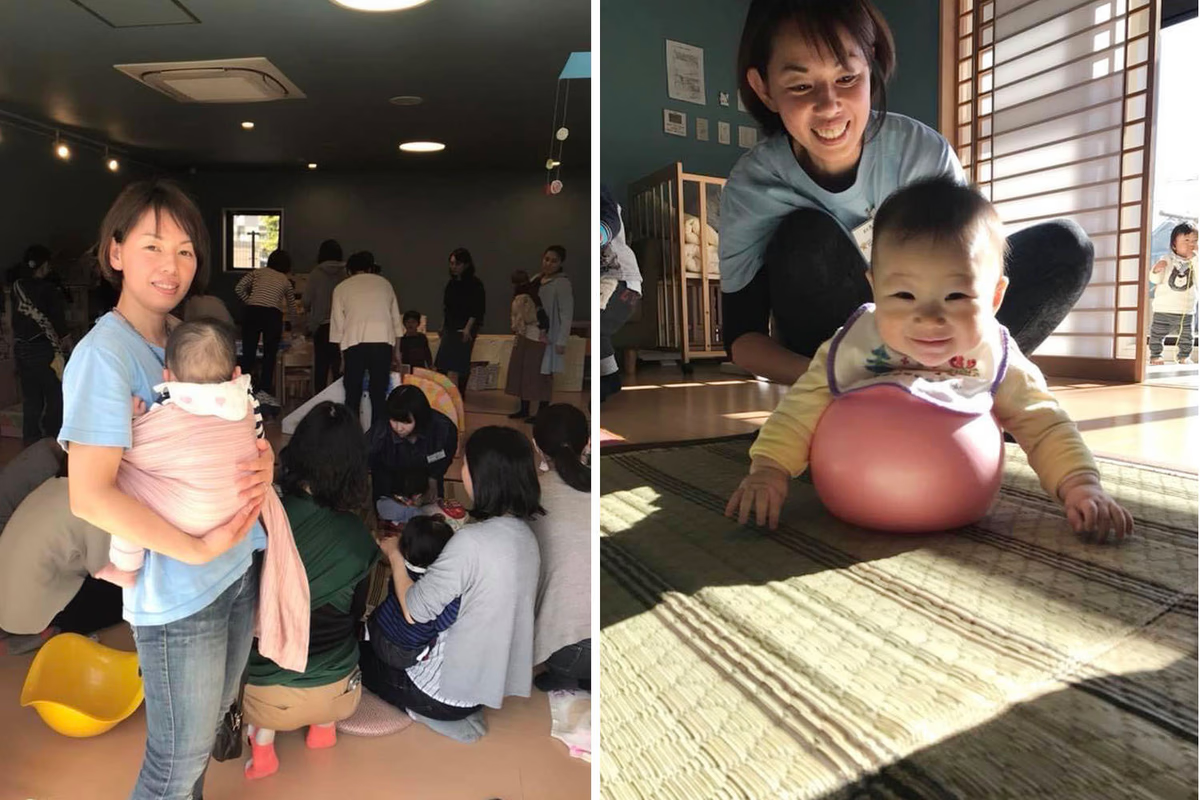 As part of the Planket project, one room in the nursery school was opened to the public once a month for child-rearing consultations. 10 to 20 parent-child pairs gathered.
As part of the Planket project, one room in the nursery school was opened to the public once a month for child-rearing consultations. 10 to 20 parent-child pairs gathered.
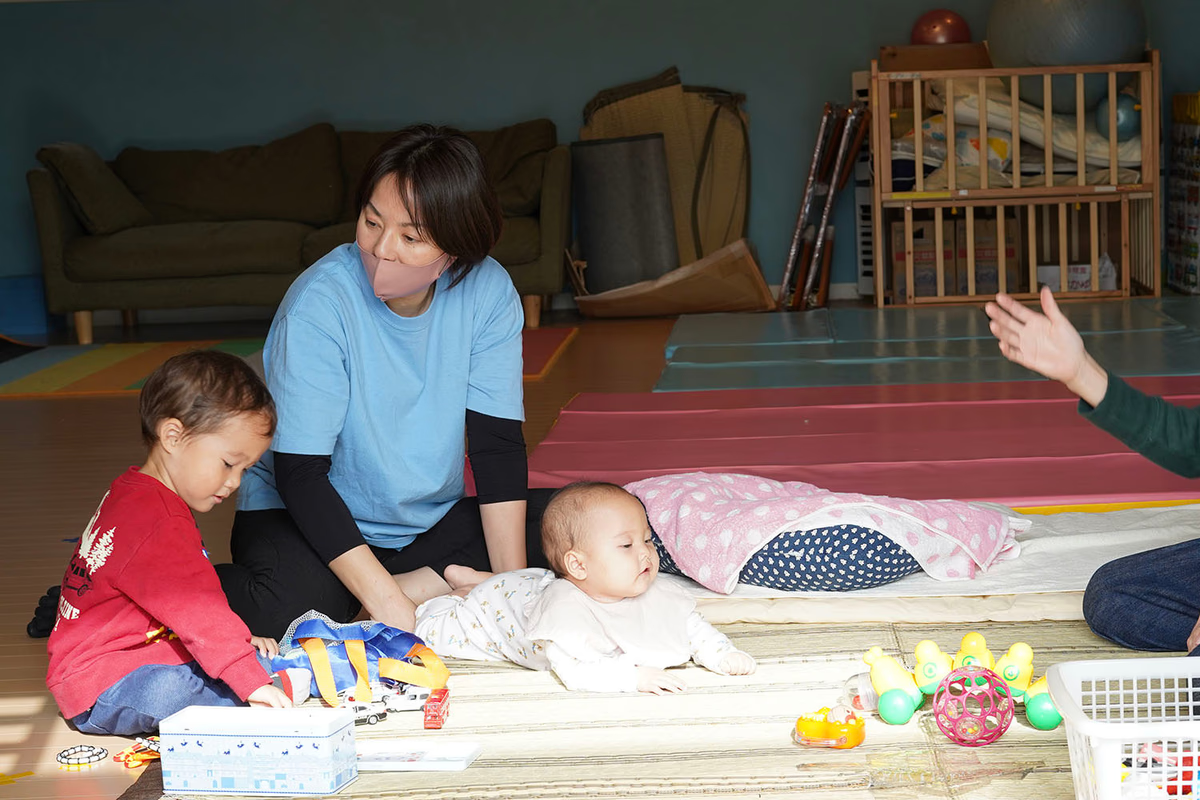 Currently, reservations are limited to 5 groups due to COVID-19.
Currently, reservations are limited to 5 groups due to COVID-19.
That's when I first looked at the motor development of 0-1 year olds, and I realized that there are a lot of children with problems in the process of motor development. For example, there are children who don't crawl much. If they can crawl properly, their core will be stronger and they won't fall when they walk. It seems that things like living in an environment that doesn't allow them to crawl, or being carried a lot of times, are also related to this.
That's why I'm running a course called "Development from the Womb ." I want people to know how important motor development * is for infants.
*Motor development at age 0: Infants at age 0 develop motor skills in the following order: rolling over → crawling → crawling → sitting → standing → walking. The order is important. Crawling in particular uses the arms and legs well, which helps develop the brain.
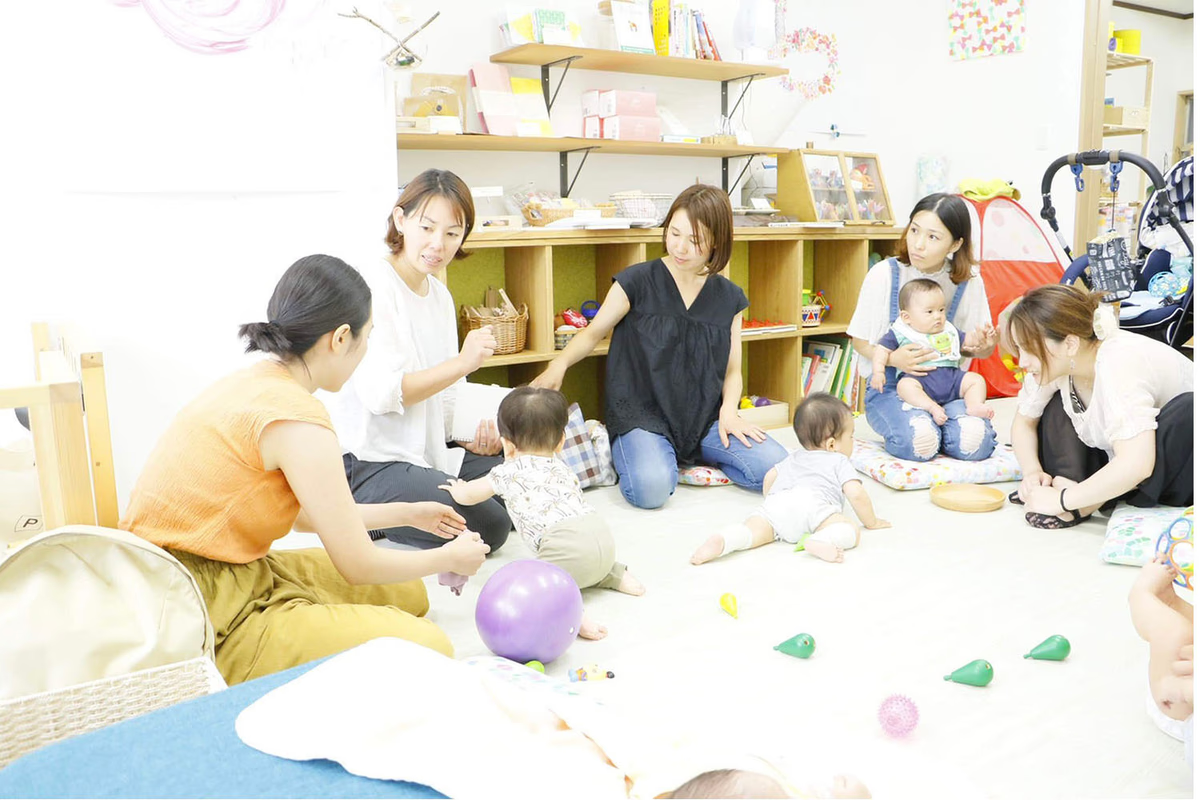
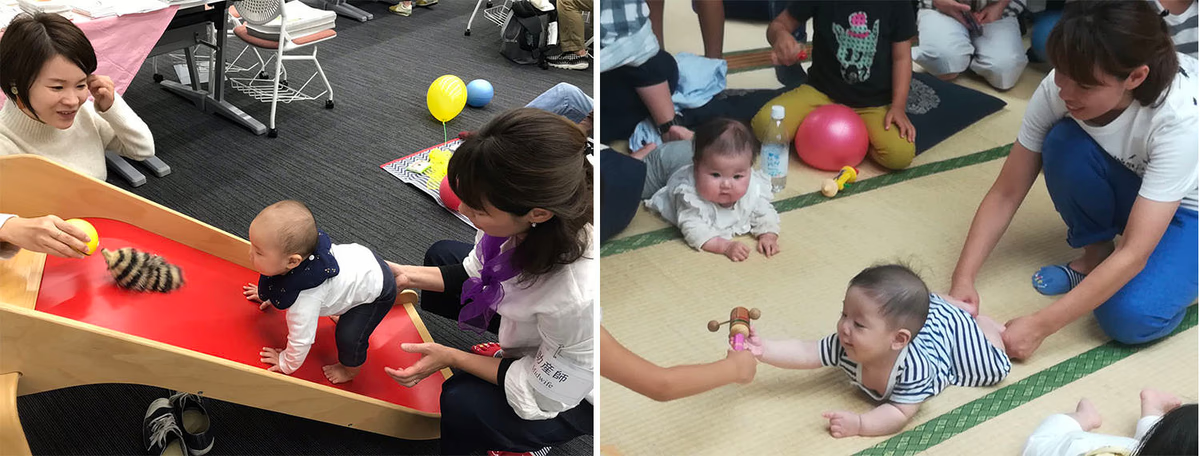 A scene from the prenatal development course. Currently held monthly at the parenting atelier Panier in Eifukucho.
A scene from the prenatal development course. Currently held monthly at the parenting atelier Panier in Eifukucho.
Tanaka: I also talk about primitive reflexes *1 and sensory integration. Nowadays, we often hear about "developmental disorders," but there are many children who simply do not have sensory integration *2 , so I want to tell them that if they start by doing exercise properly, things will change.
*1 Primitive reflexes: Reflexes that babies are born with. Reference: "What are primitive reflexes? Moro reflex, sucking reflex, grasping reflex, etc." Kizuna Collect
*2 Sensory integration: The function of the brain that coordinates the traffic between the five senses. It develops during the period when the body and brain are connected (around age 0 to 7).
My son was the trigger that made me become interested in sensory integration and primitive reflexes. When my son was in the lower grades of elementary school, he started getting into a lot of trouble, like hitting his friends. He was a shy child, so I wondered why.
When my son was in the third grade, I had him examined by a doctor who I had taken a class on exercise therapy from. It turned out that my son still had the Moro reflex and spinal primitive reflex, and that his hands were a defensive reaction.
So what should we do? We had to do the same movements as babies again, and do exercises that use the toes and hands firmly to integrate the senses. Then, the primitive reflexes gradually disappeared. After he understood why he was moving his hands, he was able to accept himself, and I was able to explain it to the teacher. Then we started studying primitive reflexes.
Primitive reflexes remain in adults as well. People who find it difficult to live, have trouble with relationships, or get nervous easily may have primitive reflexes involved. That's why it's important to use the five senses. When a baby is 0 years old, their senses develop and are integrated through physical activity, but after that, it's better to play outside. Nowadays, children can no longer play in nature, so we started an activity called "Friend Square."
The courtyard was closed for a while due to the coronavirus, but I still wanted to go.
Tanaka
I think it would be fun for children around 2 or 3 years old to come. The children will find things on their own and play with them. Some of the people I work with are good at outdoor activities and survival, and they teach their dads how to use saws, axes, and knives, as well as ropework.
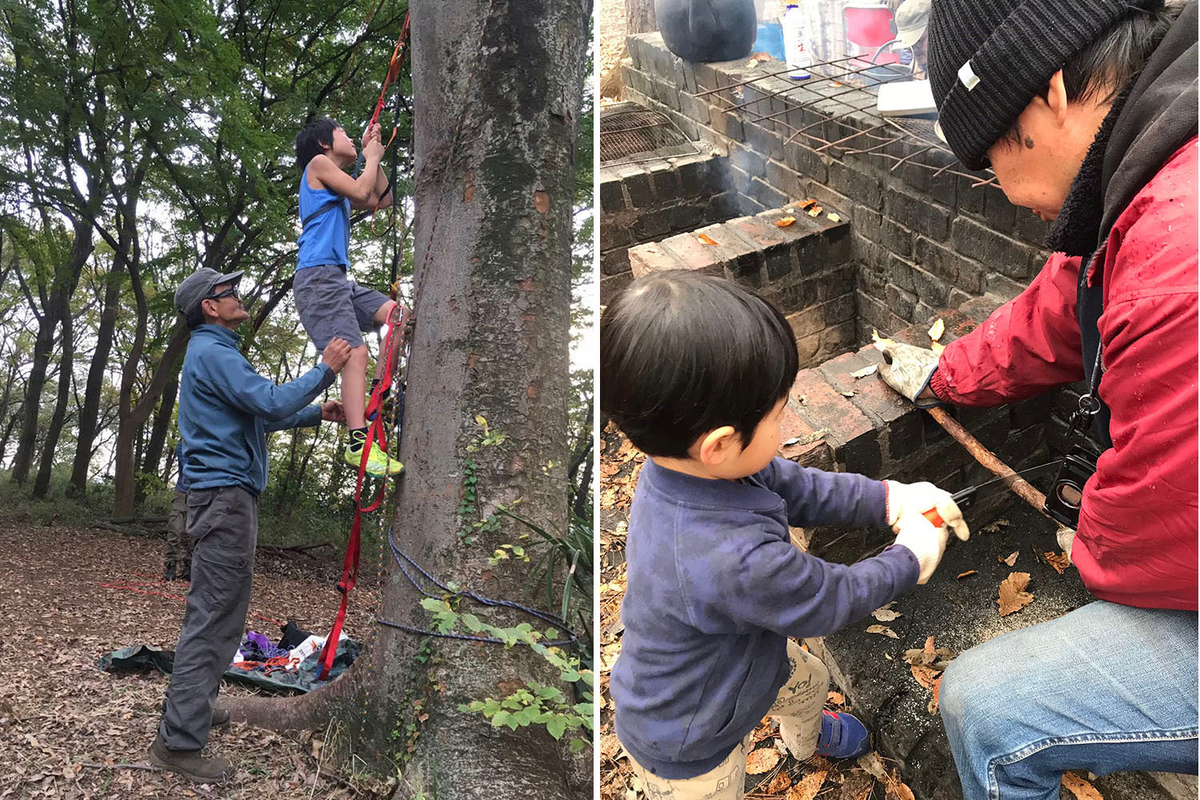
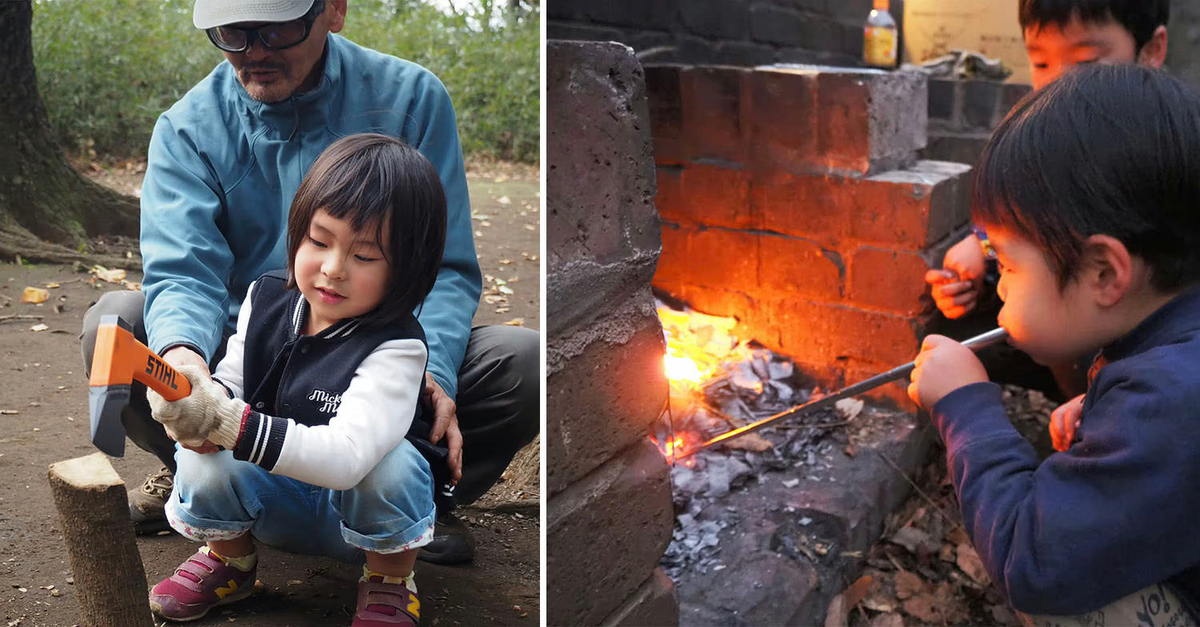
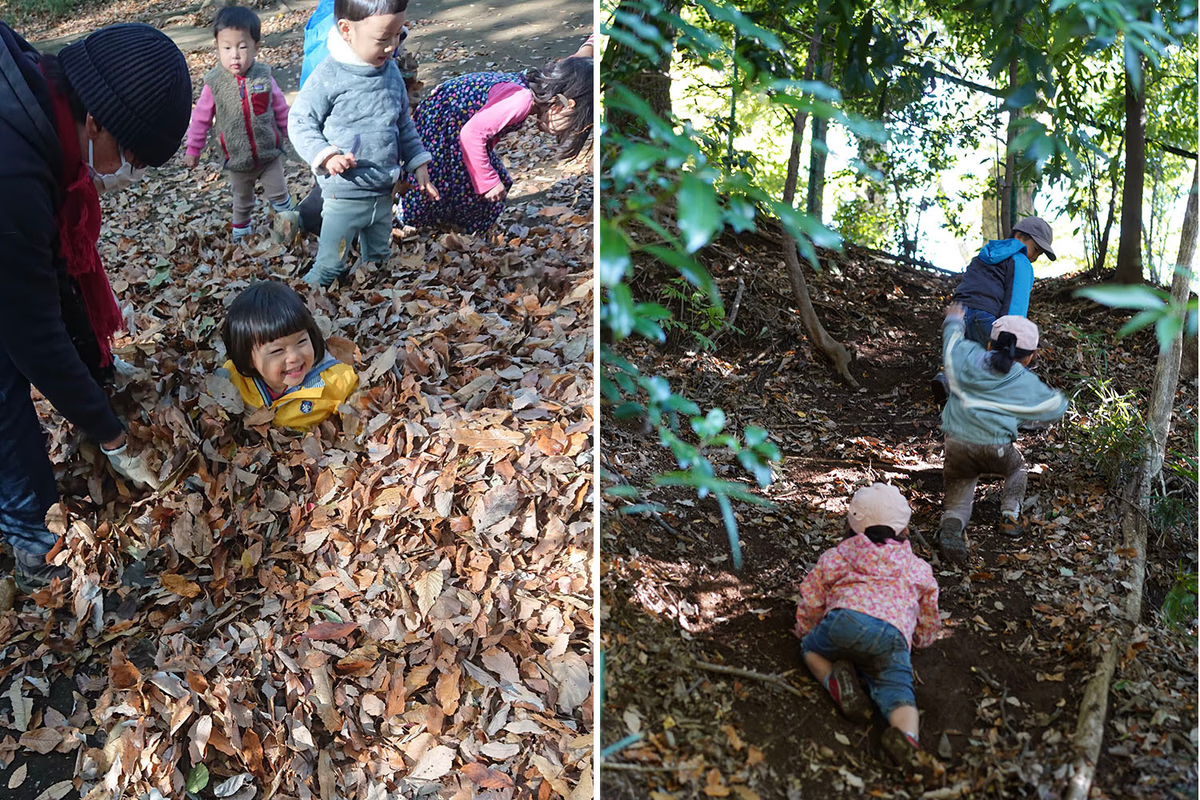
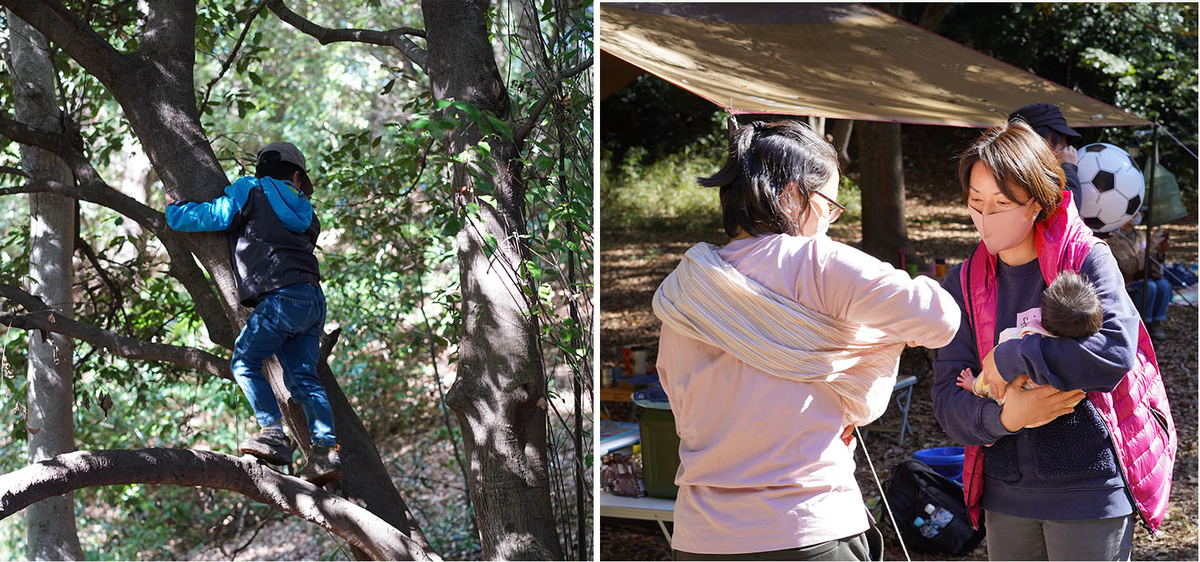
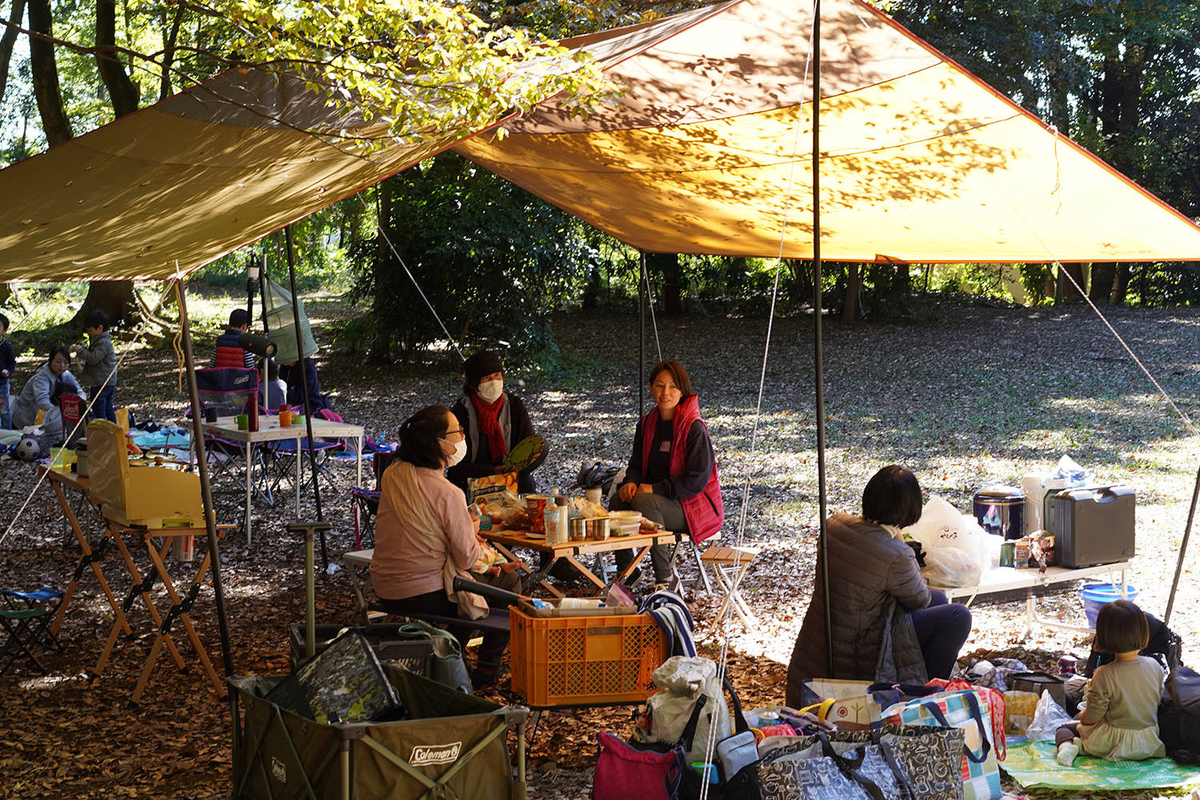
What kind of people are your friends in the courtyard ?
Tanaka: After the disaster, someone started an activity called " Fukushimakko ." Because the children of Fukushima couldn't play outside because of radiation, they invited them to a farm run by a consumer cooperative in Akiruno City and planned a week-long camping retreat. I also participated as a volunteer, and made friends with people there who were good at outdoor activities and survival. I asked them to do something in the Satoyama area of Chofu, because children today, not just those from Fukushima, have little experience with nature, and so it started. Now it's run by about four members.
Go with the flow, let go,
It's important to wait.
Listening to you talk, it seems that your own experiences of giving birth and raising children are connected to your next job.
Tanaka: Yes. To me, being a midwife is more like a calling than a job. It is a job, if you want to call it that. How should I put it, in my life, being a midwife is like "myself." It's life itself.
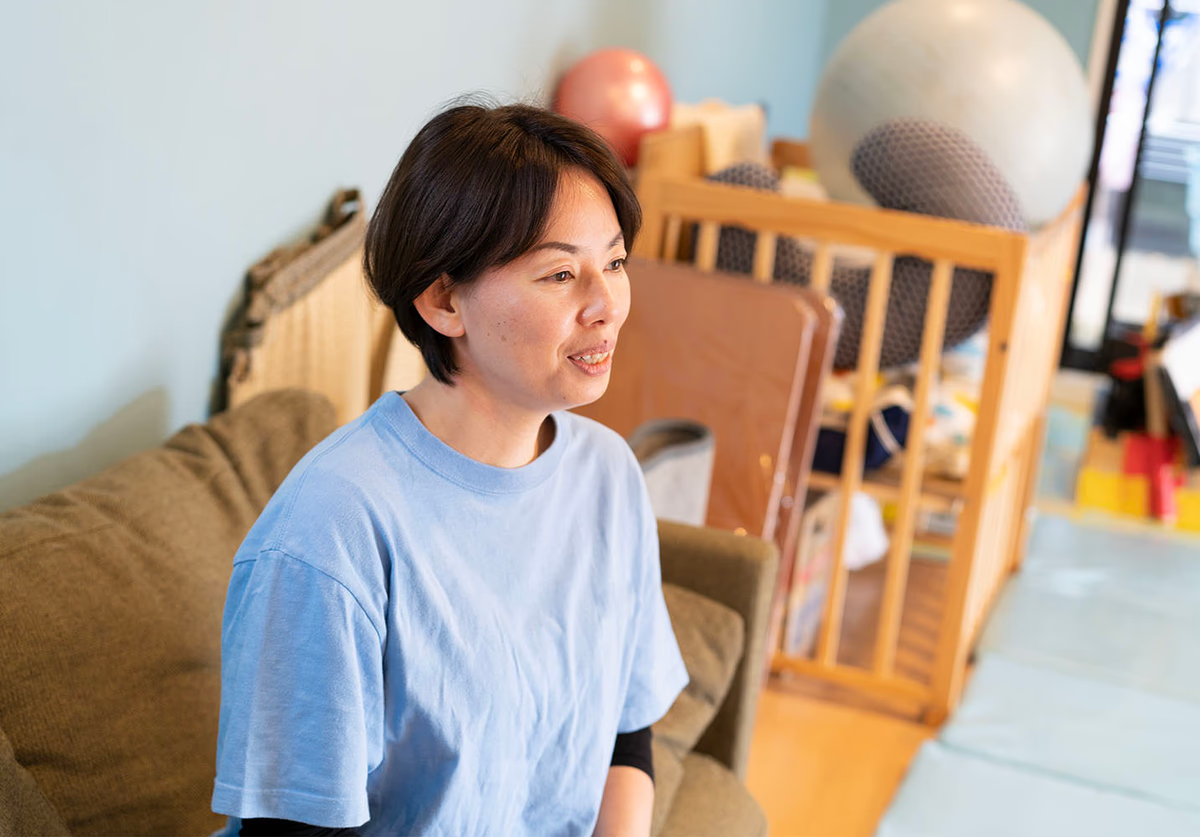
NakaniwaUntil now, I thought that midwives were a job that involved "being close to" patients, but listening to your story, it seems like it's not so much a feeling of being close to them or caring for them. How do you feel when you're with patients and mothers?
Tanaka: I've been doing craniosacral therapy for about 10 years, but I noticed something when I started. We, including medical professionals, tend to do care with the thought of "I want to make this person better," but the person receiving care feels pressured and uncomfortable. It also makes us tired. It's important to relax. But that can be difficult. I think it's a matter of awareness.
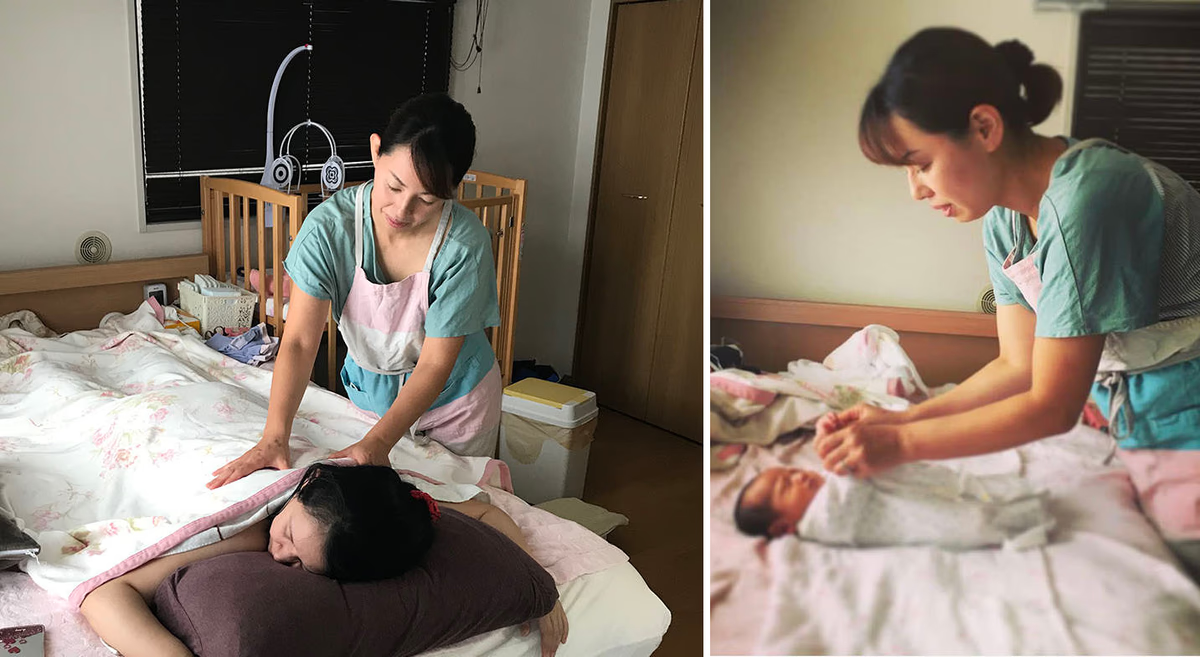 Postpartum care on-site. Providing care for mothers and babies. Continuous care from pregnancy to postpartum.
Postpartum care on-site. Providing care for mothers and babies. Continuous care from pregnancy to postpartum.
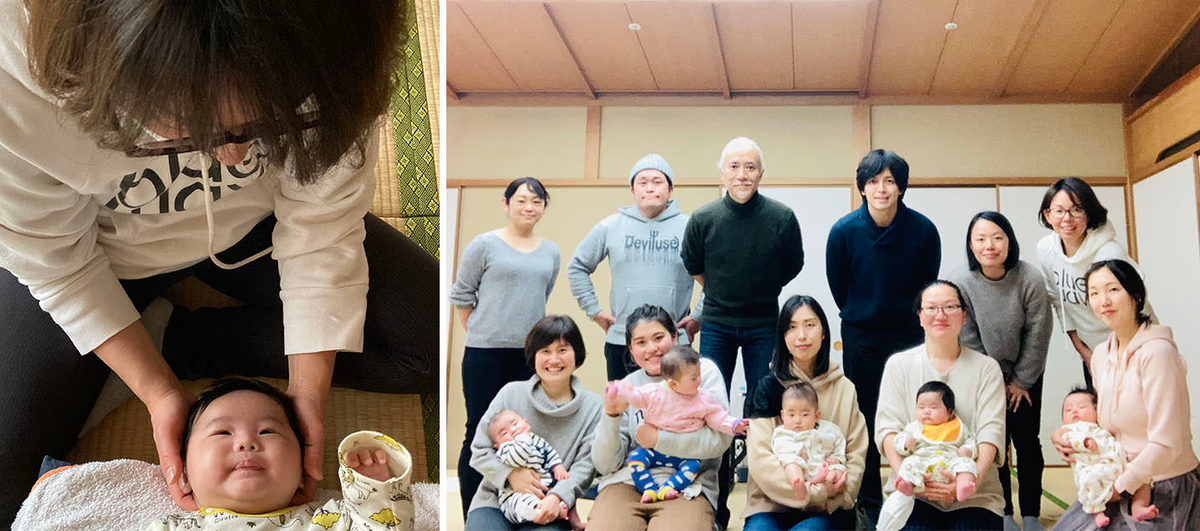 Baby Therapy (chiropractic) in action. Held monthly in various locations. Facebook
Baby Therapy (chiropractic) in action. Held monthly in various locations. Facebook
Tanaka: The treatment I do is a treatment, but it's a really light touch, like a fascia release. It's the same as when grandmothers and mothers used to treat children when they had stomach pains. It gives you a sense of security. It can be done on babies and pregnant women, so you can do it during labor, and it can make a difference just by touching them a little.
Also, when providing care, it's important to focus on yourself, not the other person.
What do you mean, courtyard ?
Tanaka-san: Try not to think too much about what to do with the person in front of you, and first of all, keep your own axis firmly in order to align your body. Then, somehow, it will be conveyed to the other person. If you try to manipulate the other person poorly, it often becomes tangled, so it is important to go with the flow, let go, and wait. There are many things I have realized recently.
Was it a little different in front of the courtyard ?
Tanaka-san was more involved. For example, if a mother is having a hard time after giving birth, I'll contact her frequently and take good care of her, but I get tired and she'll depend on me. Even during childbirth, she'll depend on me because it's really hard, but it's important to have a stance that says, "It's you who's going to give birth." I mean, I let go a little. That's what I do.
When deciding whether to give up the courtyard , do you gauge the distance by observing the person's reaction?
Tanaka-san , how should I put it, I feel that if you are involved with someone and you think that this person has a strong core, then you can give birth. Even if you think that this person is a little weak and you wish that they could be a little more prepared, it's too late at the time of birth. In that case, if I just stay calm, then this person will probably be okay. I think that this is something that can be applied anywhere, not just childbirth.
How do you get along with the courtyard people?
Tanaka: That's right. Things have changed. Even when I was in the ICU, I was always the one in charge of patients whose condition suddenly worsened. I was also the one in charge of really difficult patients during childbirth. I've come to understand that maybe that's because I'm attracting the people I want to help.
Basically, I'm the type of person who keeps fighting, and I've lived my life with the feeling that I "always have to train," so there were a lot of hard times. But I let that go, too. I don't need training anymore (laughs). Raising children isn't training either. First of all, I thought I should enjoy the present.
***
After the interview
I met Tanaka-san during my first birth. I was exhausted both physically and mentally during the long labor pains, I was receiving IV drips, and in the end I was so scared of the birth that I wanted to run away. Then, when my cervix finally started to open and it was time for the baby to be born, I was really lucky that Tanaka-san happened to be in charge. I remember well and was deeply moved by how Tanaka-san powerfully guided me through the birth in the unknown world leading up to the birth.
"I'm basically the type of person who keeps fighting," Tanaka said about herself, and that's exactly my impression of her. Whenever I met her at the hospital, she always had the air of an athlete who had just finished a match, overflowing with energy, and I remember feeling that she really loved her job. Since then, Tanaka has reigned as a "super midwife" in my eyes, and after hearing about her wide range of activities in the community, from childcare support to serving as chairman of the disaster prevention committee, I feel that she really is a super midwife (laughs).
I was also happy to hear about how Tanaka's experience raising children has led to her next job. I was reminded that by raising something, people grow together.
I think Tanaka's approach to care is condensed into the words, "It's important to let go, let go, and wait." Whether it's for mothers, children, or "people" in a broader sense, "let go, let go, and wait" without doing anything. I listened to her and thought that these were very good words.
I hope I can join you from time to time as you continue to enjoy life. I'll come to Tomodachi Hiroba too!
